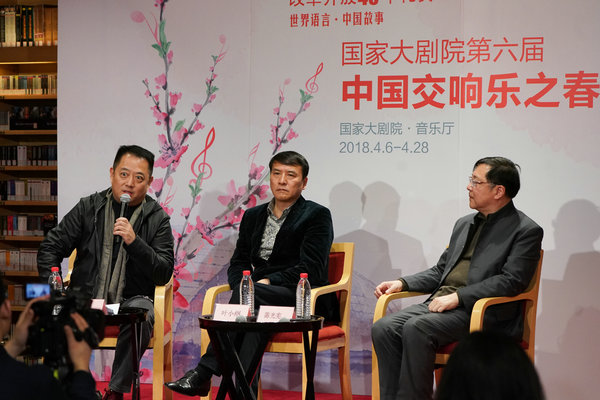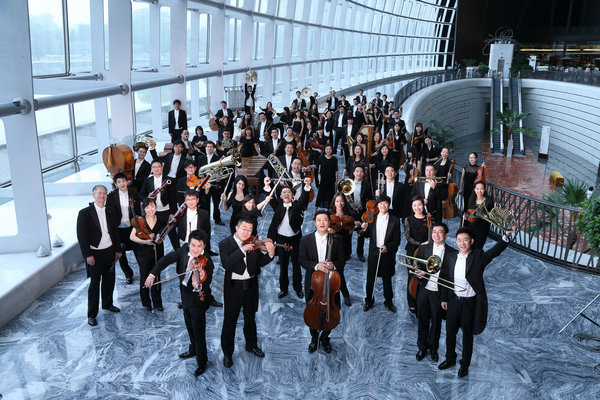Orchestra festival to celebrate original works by Chinese composers


Lyu Jia (left), artistic director of the China Orchestra Festival, and Ye Xiaogang (center), one of the composers whose works will be performed at the festival, attend a press at the National Centre for the Performing Arts in Beijing. [Photo/China Daily]
The upcoming edition of the biennial China Orchestra Festival is a special one because it marks the 40th anniversary of China's reform and opening-up.
Separately, the festival, which was launched in 2008 by the National Centre for the Performing Arts will also celebrate works by Chinese composers.
During the festival, which runs from April 6 to 28 at the NCPA in Beijing, nine Chinese symphony orchestras will perform 35 original works by 22 Chinese composers.
The festival's artistic director Lyu Jia, who will also be one of the conductors at the event, says: "This year marks the 40th anniversary of the country's reform and opening-up, which led to China opening up to the rest of the world, and a transformation of the economy.
"Musically, during the past four decades, the country's classical music scene also made great strides, and the compositions to be performed at the festival will reflect the achievements and the development of China's classical music."
The festival will open with a concert by the China National Symphony Orchestra under Tang Muhai, and will feature eight pieces, including Symphonic Opera of 3 Notes by Tan Dun, Casting Sword by Ye Xiaogang and Torch Festival by Wang Xilin.
The Chinese tenors Shi Yijie, Shen Yang and Liu Songhu will also take part of the concert.
Speaking about the festival's themes, composer Ye, 63, who is the chairman of the Chinese Musicians' Association and vice-president of the Central Conservatory of Music, says: "The year of 1978 is special to me because that was when I came to Beijing and began my studies at the conservatory. And from then on, I had the opportunity to learn music and speak through music."
Ye, who was born into a music-loving family in Shanghai, is regarded as one of the top Chinese composers of his generation.
Speaking about his work over the past few decades, he says: "I have traveled a lot and always wanted to compose because it felt like I was documenting the changes in the country.

The NCPA Orchestra will perform works by several Chinese composers including Zhao Jiping, Chen Qigang and Guan Xia. [Photo/China Daily]
"I believe it's same for other Chinese composers, whose works will be performed at the festival."
Commenting on the global impact of Chinese composers, Ye, who says he traveled to the Tibet autonomous region seven times to compose the piece, Twilight of the Himalayas, adds: "Many Chinese orchestras have toured the world, but besides presenting Western classics they have always presented original works by Chinese composers to foreign audiences.
"We-both Chinese composers and symphony orchestras-have managed to start a conversation between Chinese culture and Western classical music."
Meanwhile, besides Casting Sword-from his symphonic poem commemorating Chinese writer, Lu Xun (1881-1936)-another of Ye's works, Songs from the Steppe, which was commissioned and first performed by the Baotou Symphony Orchestra at the NCPA in June 2017, will be performed at the NCPA event on April 20, this time by the Shanghai Philharmonic Orchestra.
Separately, the China Orchestra Festival will also offer a platform to the country's young homegrown symphony orchestras.
Among them will be the Suzhou Symphony Orchestra, which was founded at the end of 2016, and the symphony orchestra of the Central Conservatory of Music, which was established in 2017.
Speaking about the young talent, Chen Guangxian, the director of China's Symphony Development Foundation, a nonprofit organization, says that the number of symphony orchestras has grown dramatically in China over the past few years.
He says that there were around 30 professional symphony orchestras in China four years ago, with the number growing to 82 as of 2017.
"Over the years, more than 40 Chinese symphony orchestras have performed at the NCPA's China Orchestra Festival," he says.
"And we have many more young talents in the country, who are composers, conductors and instrumentalists," says Chen, who is also the director of Suzhou Symphony Orchestra.
Speaking about the Suzhou orchestra, he says that more than 60 percent of its musicians have spent time abroad, which gives the orchestra a different and vibrant quality.
In 2017, the orchestra toured Germany and France. And it will perform in Japan and Singapore later this year.
On April 28, the last day of the festival, the NCPA Orchestra will perform Zhao Jiping's Pipa Concerto No 2 and Violin Concerto No 1; Chen Qigang's Jiang Tcheng Tse for the collaboration of a Peking Opera style female singer, mixed chorus and symphony orchestra; and Guan Xia's Piano Concerto The Founder: Movement I, under the baton of Lyu.




